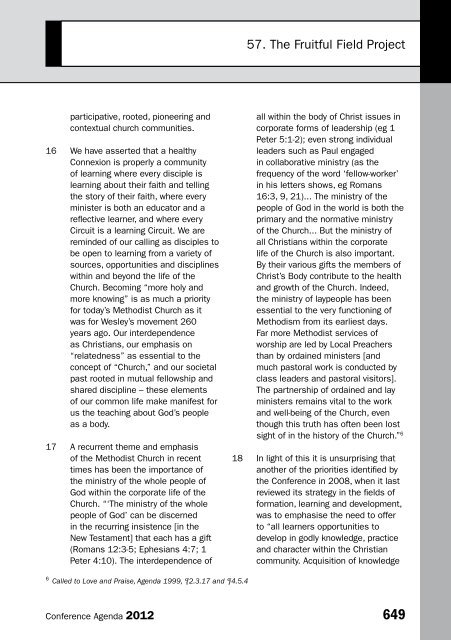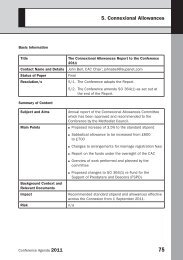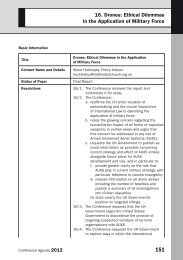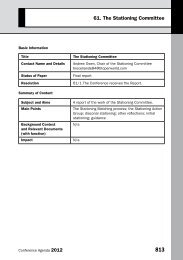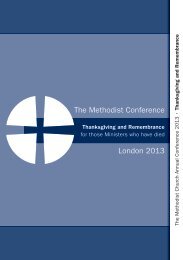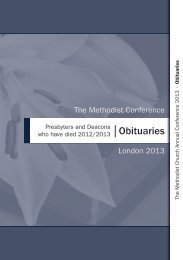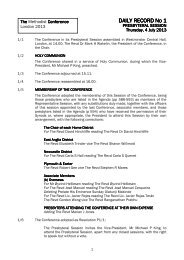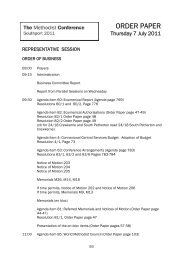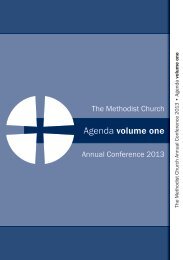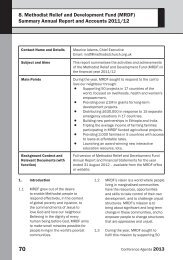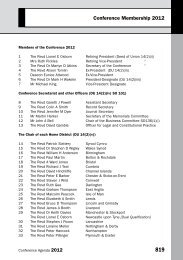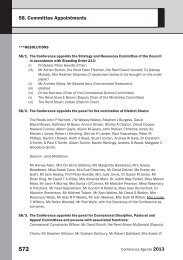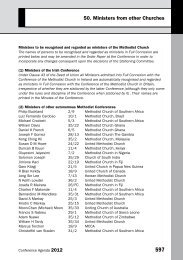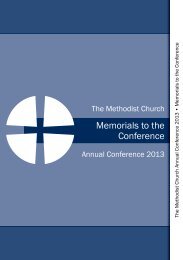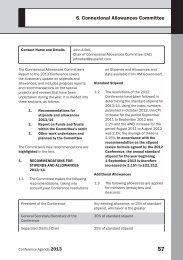Agenda Volume 3 - Methodist Conference
Agenda Volume 3 - Methodist Conference
Agenda Volume 3 - Methodist Conference
Create successful ePaper yourself
Turn your PDF publications into a flip-book with our unique Google optimized e-Paper software.
57. The Fruitful Field Project<br />
participative, rooted, pioneering and<br />
contextual church communities.<br />
16 We have asserted that a healthy<br />
Connexion is properly a community<br />
of learning where every disciple is<br />
learning about their faith and telling<br />
the story of their faith, where every<br />
minister is both an educator and a<br />
reflective learner, and where every<br />
Circuit is a learning Circuit. We are<br />
reminded of our calling as disciples to<br />
be open to learning from a variety of<br />
sources, opportunities and disciplines<br />
within and beyond the life of the<br />
Church. Becoming “more holy and<br />
more knowing” is as much a priority<br />
for today’s <strong>Methodist</strong> Church as it<br />
was for Wesley’s movement 260<br />
years ago. Our interdependence<br />
as Christians, our emphasis on<br />
“relatedness” as essential to the<br />
concept of “Church,” and our societal<br />
past rooted in mutual fellowship and<br />
shared discipline – these elements<br />
of our common life make manifest for<br />
us the teaching about God’s people<br />
as a body.<br />
17 A recurrent theme and emphasis<br />
of the <strong>Methodist</strong> Church in recent<br />
times has been the importance of<br />
the ministry of the whole people of<br />
God within the corporate life of the<br />
Church. “‘The ministry of the whole<br />
people of God’ can be discerned<br />
in the recurring insistence [in the<br />
New Testament] that each has a gift<br />
(Romans 12:3-5; Ephesians 4:7; 1<br />
Peter 4:10). The interdependence of<br />
all within the body of Christ issues in<br />
corporate forms of leadership (eg 1<br />
Peter 5:1-2); even strong individual<br />
leaders such as Paul engaged<br />
in collaborative ministry (as the<br />
frequency of the word ‘fellow-worker’<br />
in his letters shows, eg Romans<br />
16:3, 9, 21)... The ministry of the<br />
people of God in the world is both the<br />
primary and the normative ministry<br />
of the Church... But the ministry of<br />
all Christians within the corporate<br />
life of the Church is also important.<br />
By their various gifts the members of<br />
Christ’s Body contribute to the health<br />
and growth of the Church. Indeed,<br />
the ministry of laypeople has been<br />
essential to the very functioning of<br />
Methodism from its earliest days.<br />
Far more <strong>Methodist</strong> services of<br />
worship are led by Local Preachers<br />
than by ordained ministers [and<br />
much pastoral work is conducted by<br />
class leaders and pastoral visitors].<br />
The partnership of ordained and lay<br />
ministers remains vital to the work<br />
and well-being of the Church, even<br />
though this truth has often been lost<br />
sight of in the history of the Church.” 6<br />
18 In light of this it is unsurprising that<br />
another of the priorities identified by<br />
the <strong>Conference</strong> in 2008, when it last<br />
reviewed its strategy in the fields of<br />
formation, learning and development,<br />
was to emphasise the need to offer<br />
to “all learners opportunities to<br />
develop in godly knowledge, practice<br />
and character within the Christian<br />
community. Acquisition of knowledge<br />
6 Called to Love and Praise, <strong>Agenda</strong> 1999, 2.3.17 and 4.5.4<br />
<strong>Conference</strong> <strong>Agenda</strong> 2012 649


